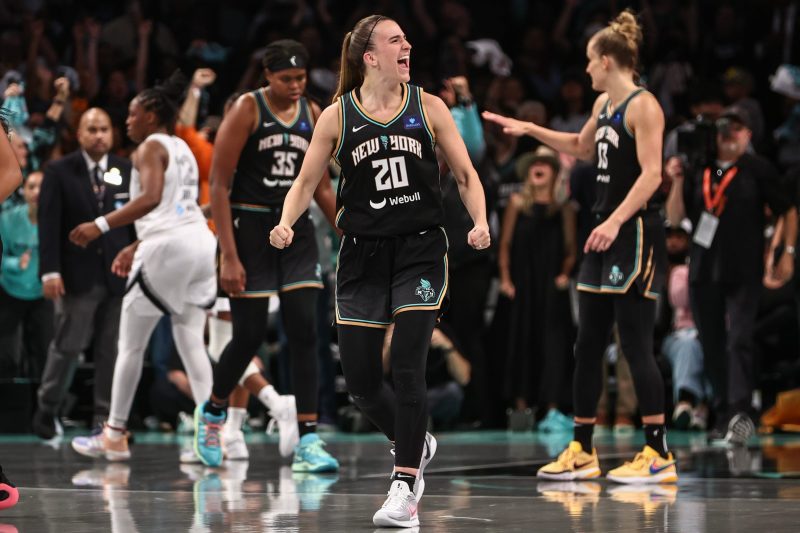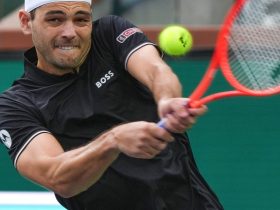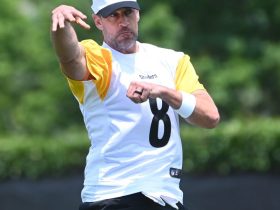LAS VEGAS — Sabrina Ionescu couldn’t score.
In Walnut Creek, California, Ionescu was a short, scrawny sixth-grader playing on an eighth-grade boys team with her twin brother Eddy. Male defenders were considerably bigger and stronger, bumping her and altering her shot. Most days, Ionescu couldn’t get close to the rim.
So the guard who would set an NCAA record in triple doubles in college (26) figured it was time to add something to her skill set. She developed a floater.
Fifteen years later, that floater has become maybe the deadliest shot in the WNBA playoffs and a key piece of the New York Liberty’s run to its second consecutive Finals appearance. The Liberty host the Minnesota Lynx in Game 1 on Thursday at Barclay’s Center in Brooklyn in the best-of-five series.
Ionescu, who averaged 18.2 points, 6.2 assists and 4.4 rebounds during the regular season, is having a career year for New York. And a lot of it is because of one of the toughest, trickiest shots in basketball.
Coaches, players and analysts talk about being a “three-level scorer,” basketball-speak for being able to get buckets at the rim, in the midrange and on the perimeter. With the addition of a floater, Ionescu has exploded as a three-level scorer this season.
Las Vegas coach Becky Hammon has been adamant about Ionescu deserving first-team All-WNBA honors, calling her “the whole key to them this season.”
Ionescu, 26, is in her fifth WNBA season but essentially, it’s her fourth. A nasty left ankle injury just three games into her rookie year practically ended her season before it began, sidelining her for months.
Though she was an All-Star in 2022 and 2023, she didn’t do much in the 2023 Finals, as the Aces secured their second consecutive WNBA championship, on the Liberty’s floor. Ionescu averaged just 9.8 points in four games, shooting a forgettable 31.6%.
But she was a difference maker in the semifinal rematch this postseason, averaging 17.8 points and shooting 48.1%. In the Liberty’s series-clinching Game 4 victory in Vegas, Ionescu scored a game-high 22, also grabbing seven rebounds. She started hot, hitting an early 3 before muscling into the lane to drop a floater through the net, drawing a foul. It’s become a signature move.
And it’s especially gratifying, because she spent her offseason perfecting the dormant shot.
“I’ve always had it,” she said, pointing out that her floater often tortured defenses when she was in college at Oregon. “Having an injury on my left foot derailed me from being able to use it. You take off on your left foot for a right-handed floater, and I didn’t have enough strength to be able to do it comfortably. I was coming off two feet at all times those first years back.
“It’s something I’m really proud of myself for being able to re-integrate back into my game. I think it’s opened up the floor for me.”
Her teammate Courtney Vandersloot, a veteran guard now in her 14th season, agrees.
“Her ability to get downhill and her finishing has really opened a lot of things up for her,” Vandersloot said, explaining that Ionescu has entered “the sweet spot” of her pro career, where she’s experienced enough to understand what works, but young enough to keep improving.”
A great floater is one of the prettiest shots in basketball, but surprisingly intricate to copy. Because you’re taking off on one leg, fatigue plays a factor. Rotation of the ball is crucial, and players have to gauge in a split-second if they’re going to use the backboard or not. It’s hard to practice, Ionescu said, because you have to go full speed, and it’s tough to re-enact a game situation with numerous defenders trying to clog the paint, forcing ball handlers to attack from different angles.
When she watched film from 2023, it was obvious to Ionescu that teams left her open in the midrange, and she’d have more opportunities to score — if she could adjust.
“(You need) to be able to shoot a floater, because sometimes a jump shot just takes too long,” she said. “By the time you load into it, teams can come by (and recover). The floater’s a little unpredictable because you’re mid-dribble.”
It’s also a terrific shot for someone with Ionescu’s passing ability and vision. Big guards who go up for floaters can decide at the last second to pass — in Ionescu’s case, to any of her All-Star and/or Olympian teammates.
The shot has other benefits, too: Because a guard’s momentum hasn’t carried them all the way to the baseline, they’re in position to rebound their miss if necessary. It also allows guards’ bodies to take less of a beating, pulling up before they make contact.
Done well, it can be back-breaking for defenses.
“She puts immediate pressure on your defense, always, because she can pull it from seven feet behind (the 3-point line),” Hammon said. “You don’t have any room to relax. You can’t gamble. She’s big enough that if you gamble and she gets by you, she’s gonna be at the rim, and she’s a good enough and big enough passer to find people.”
A basketball junkie, Ionescu likes to watch NBA games to see what she can learn — and steal — from individual players. Long compared to Steph Curry because of her range, Ionescu has studied the way the 10-time All-Star attacks the paint and gets to the rim despite his thin frame. The biggest difference in Curry and Ionescu, though, is that Curry is small for an NBA guard at just 6-foot-2; meanwhile, Ionescu’s 5-foot-11 frame is big for the women’s game.
The best NBA comp for Ionescu is probably Dallas Mavericks star Luka Doncic, a 6-foot-7 guard who can score, and create scoring opportunities for his teammates, at will. Ionescu has watched countless clips of Doncic, noting the way his strength and length — two things Ionescu also boasts — allow him to get into the lane repeatedly. Doncic does not allow defenders to speed him up, Ionescu said, something she’s tried to replicate.
“He knows what he wants to get, and he gets it,” she said.
She knows what she wants, too — a WNBA championship. And she’s prepared to use any and all shots necessary to get it.






